








Rabiah Na’Allah and Rose Foley started working for the department in the fall of 2022 and will both graduate with a Bachelor of Fine Arts in spring 2024. Rose majored in graphic design and pursued a certificate in event management. Rabiah also majored in graphic design and completed a minor in cinema.
Reflecting back on her time at the ME department, Rabiah says, “I couldn’t imagine a better job to have while being a student at the University. The kindness of the faculty and staff, as well as the positive working atmosphere and real-world experience I’ve gained, will stay with me forever!” After graduation, she plans to work in Chicago and spend her free time traveling and planning trips around the world.
Rose remarks on her time at the ME department and says, “I am so grateful for my time here at Mechanical Engineering as well as the wonderful team and professors I got to work with along the way. This job has given me so much beyond just workplace knowledge, and I will miss being a part of the ME family.” After graduation, Rose hopes to bring the skills she’s learned throughout her role to design as part of an events team in Chicago.
The ME department will deeply miss both office assistants and will always cherish their uplifting attitude, hard work, and dedication.
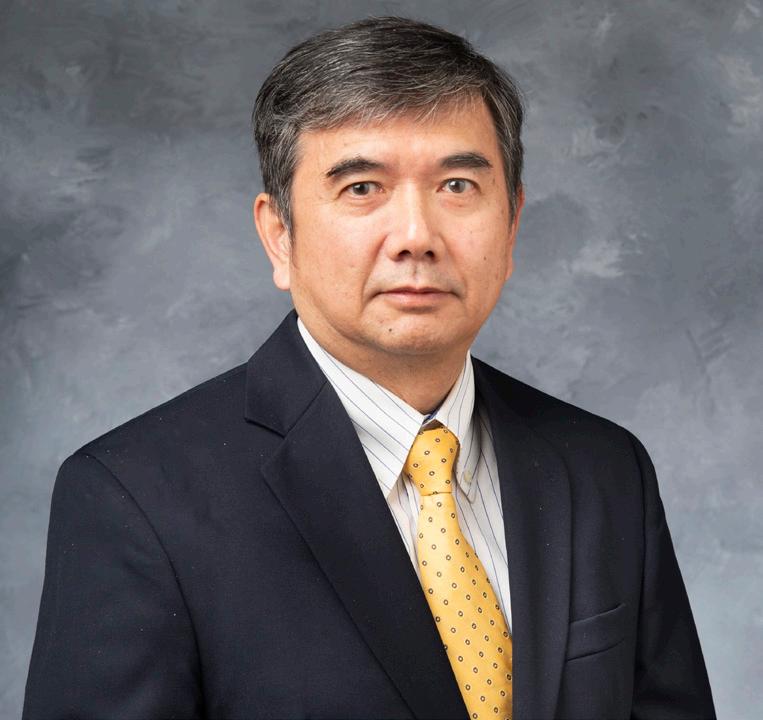
The ME department has had a stellar academic year in 2023-2024. Assistant Professor Cong Wang, who specializes in experimental fluid mechanics and received training from the California Institute of Technology, is the youngest faculty member in the department. Dean Ann McKenna is also a new member of the department. Furthermore, Professor Karim Abdel-Malek will be rejoining our department as his primary affiliation.
In terms of faculty advancements, three assistant professors Casey Harwood, Caterina Lamuta, and Venanzio Cichella have been reviewed for promotion to the rank of associate professor with tenure, while Associate Professor Hongtao Ding has been evaluated for promotion to the rank of professor. Their remarkable accomplishments have been duly recognized both internally and externally.
Numerous faculty members have garnered new grants, underscoring the department’s vibrant research environment. Among them are my NIH R01 grant, Rachel Vitali’s NSF grant, Sharif Rahman’s NSF grant, and Caterina Lamuta’s prestigious DARPA Director’s Fellowship. Additionally, Assistant Professor Venanzio Cichella, who serves as the director of the Cooperative Autonomous Systems (CAS) Lab, is spearheading the establishment of a sizable indoor drone facility, poised to accommodate the flight of over a thousand drones.
The department welcomes its new department administrator, David Scholz. His father, Paul D. Scholz, held esteemed positions as a professor of mechanical engineering from 1967 to 1992 and as associate dean of the College of Engineering from 1979 to 1992. A cherished memory of the late Professor Scholz remains preserved in an old faculty group photo displayed in the department office.
Edward M. Mielnik and Samuel R. Harding Professor
Departmental Executive Officer Department of Mechanical Engineering
Abdullah Hassanin is another new addition to the department as lab manager. Having relocated from Egypt to Iowa, Abdullah oversees the operations at the Engineering Fluids Laboratories and the Ralph and Barbara Stephens Experimental Engineering Laboratory. Abdullah has implemented a comprehensive lab management system that effectively supports the operations of these two teaching labs. Building upon this success, we are currently in the process of recruiting two additional lab managers. One will be dedicated to supporting the Engineering Manufacturing Lab and the Control, Automation and Robotics (CAR) Lab, while the other, affiliated with the Department of Electrical and Computer Engineering, will assist in the management of our future control and Internet of Things (IoT) Lab.
In this newsletter, we highlight the journey of Avik Samanta, a recent alum who is now assistant professor in the Department of Mechanical Engineering at the University of South Florida. I often use his impressive publication record to motivate and inspire our graduate students. Moreover, we celebrate the achievements of two students who received research excellence awards, alongside several others who were awarded scholarships.
Finally, the departmental winter party continues to be an annual highlight for everyone involved. A group photo featured on the last page of this newsletter captured the joyful moment for our departmental winter party last December. We were honored to have Dean McKenna join us for this event. One highlight was the presence of emeritus faculty member Ralph Stephens. The radiant smiles and shared happiness in that picture embody the promising future of our department. We are grateful for your ongoing support and wish everyone safety and good health.

Two University of Iowa Professors, Rachel Vitali and Sharif Rahman, have been awarded the prestigious National Science Foundation (NSF) grant to pursue their research.
Data shows as many as half of entering students, particularly those identifying as underrepresented minorities and women, leave their engineering program after the first or second year, with many reporting lost interest or even disliking engineering. Rachel Vitali, a University of Iowa assistant professor of mechanical engineering, proposes this is partially due to a mismatch between expectations of engineering and what students learn in the classroom during the
Through a new two-year study, Vitali plans to modify the teaching approach in the middle two years of an engineering program to see if that helps correct perceptions as well as intentions to persist in the major and workforce. Specifically, Vitali plans to incorporate a more contextual, holistic framing of how engineering has been practiced throughout modern history in the classroom. Another innovative teaching strategy will provide students with more descriptive context for how engineering science concepts are implemented in practice, particularly how it relates to design, and how engineering judgment is essential in that implementation. Through surveys and interviews, Vitali hopes to understand if this different approach leads to positive outcomes. The study is funded by a $152,201 NSF grant. It is titled, “Collaborative Research: Research Initiation: Contextualizing Engineering Science Courses by Teaching History and Judgement.” Aaron W. Johnson, an assistant professor of aerospace engineering at the University of Michigan, is a collaborator on the project.
In addition to Professor Vitali, another University of Iowa engineering professor is developing advanced computational algorithms to optimize designs of complex engineering systems and structures that could make ground vehicles, aerospace structures, and electronic packaging, among many examples, more dependable.
Uncertainties often confront manufacturing processes, material properties, and operating environments. Sharif Rahman, a professor of mechanical engineering and a faculty affiliate of the Iowa Technology Institute, is working to overcome this through calculations that would determine the best design alternative given uncertainties of system behavior and the influence of variables. “Potential engineering applications include ground vehicle design for improved durability and crashworthiness, fatigueand fracture-resistant design for aerospace applications, and design of microelectronic packaging under harsh environments,” according to Rahman. The National Science Foundation (NSF) has recognized the importance of this research with a new grant that will sponsor Rahman’s work. The three-year grant comes with $431,033 in funding. This is Rahman’s 11th NSF project, and fifth from NSF’s Engineering Design program.
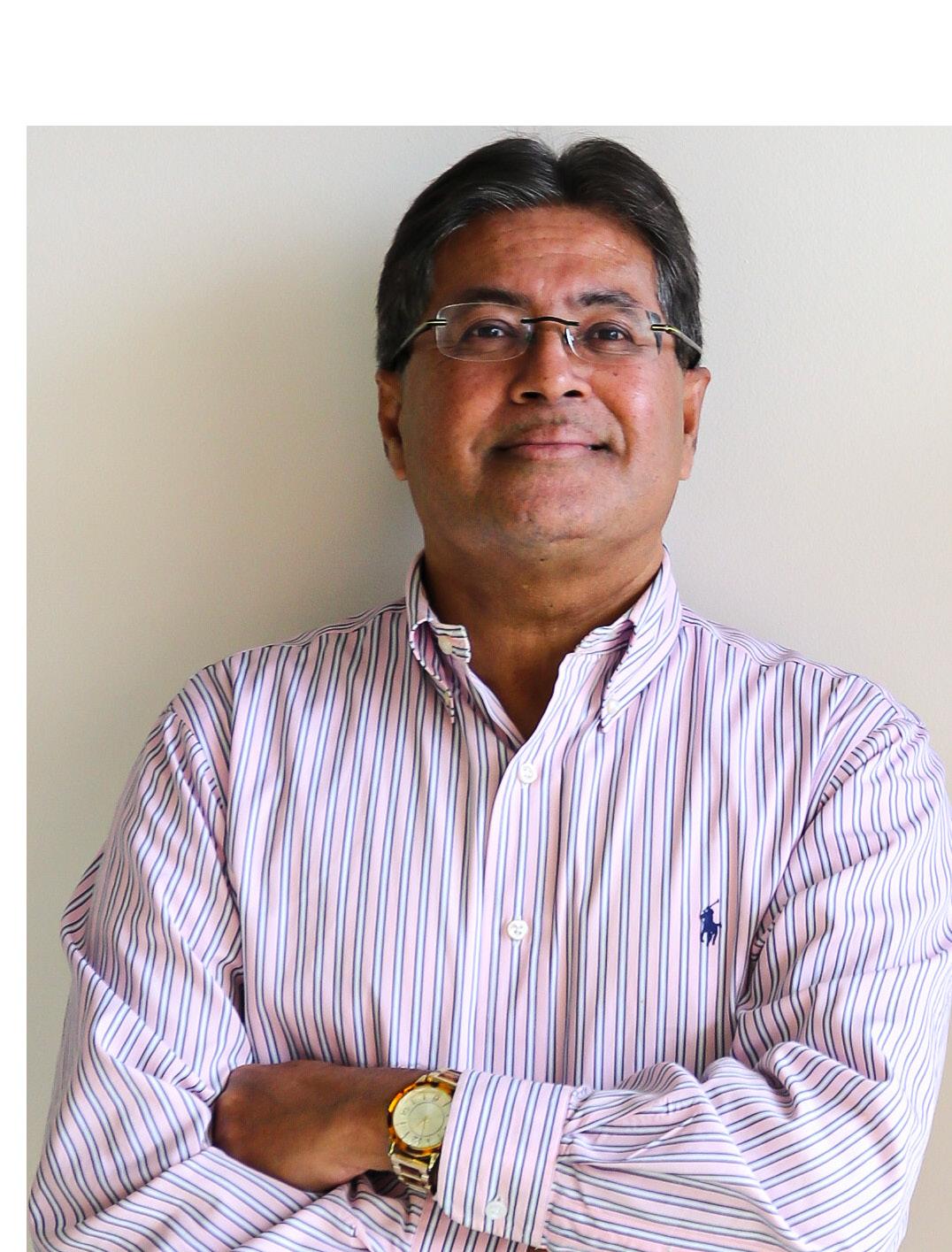
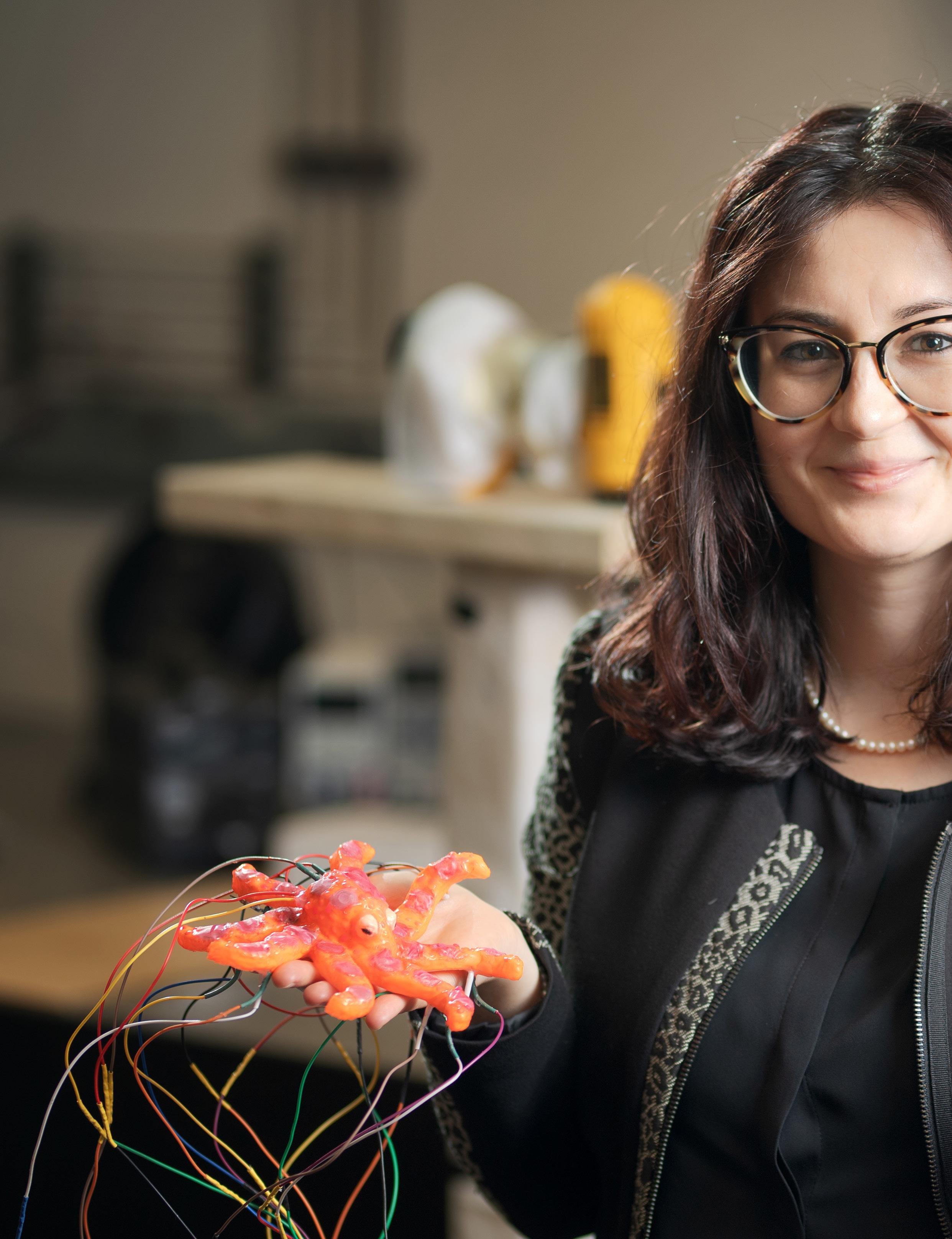 DARPA DIRECTOR’S FELLOWSHIP RECOGNIZES
DARPA DIRECTOR’S FELLOWSHIP RECOGNIZES
Caterina Lamuta, a University of Iowa assistant professor of mechanical engineering, has received the selective Director’s Fellowship from Defense Advanced Research Projects Agency (DARPA) to continue development of an underwater robot that mimics the movement of an octopus or squid. The prestigious award provides an optional third year of funding for Young Faculty Award (YFA) winners who demonstrated success during the first two years of the program.
Lamuta received the YFA in 2021. The YFA sponsors early career faculty to pursue high-risk, high-reward research addressing national security needs. “Professor Lamuta undeniably shines as a rising star within our junior faculty cohort,” said Ching-Long Lin, professor and departmental executive officer of mechanical engineering and Edward M. Mielnik & Samuel R. Harding Professor of Mechanical Engineering. “Her accomplishments here at Iowa have been nothing short of remarkable, as evidenced by her ability to secure funding from a wide array of agencies and solidify her position as a pioneering figure in the area of smart materials.”
Lamuta has been developing self-morphing, stretchable soft skins that mimic movement of tentacles found on cephalopods, such as octopus or squid. The technology could be used in underwater vehicles and robots to improve efficiency, reduced deterioration, and provide capabilities to grasp and move objects as well as crawl in the ocean.
During the first two years of the YFA award, Lamuta developed different types of soft tentacles powered by twisted and coiled artificial muscles (TCAMs), which can perform contraction, extension, bending, and torsion underwater. “Our work included bioinspired design, theoretical modeling, manufacturing, and testing of TCAMs and tentacles,” Lamuta said. “We developed waterproof working prototypes and also built a Rube Goldberg chain reaction machine to demonstrate that all tentacles work together underwater.”
During the third year, Lamuta plans to assess her lab’s current tentacle devices in real underwater conditions. Lamuta and team are using the Fluids Lab in Seamans Center and the IIHR Wave Basin for the underwater tests. The additional third year will provide $280,004 in funding, bringing the total funding over three years to $702,775.
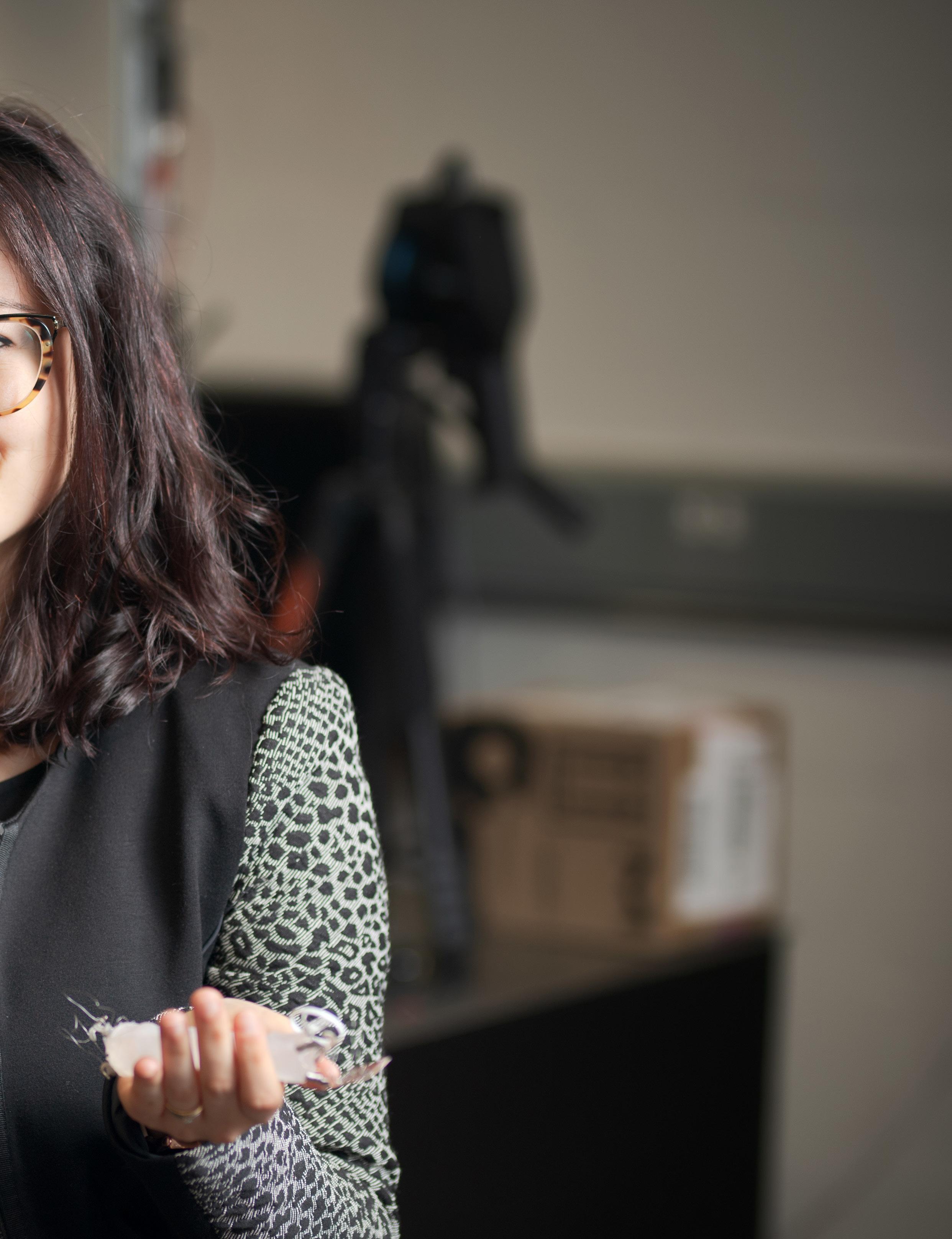

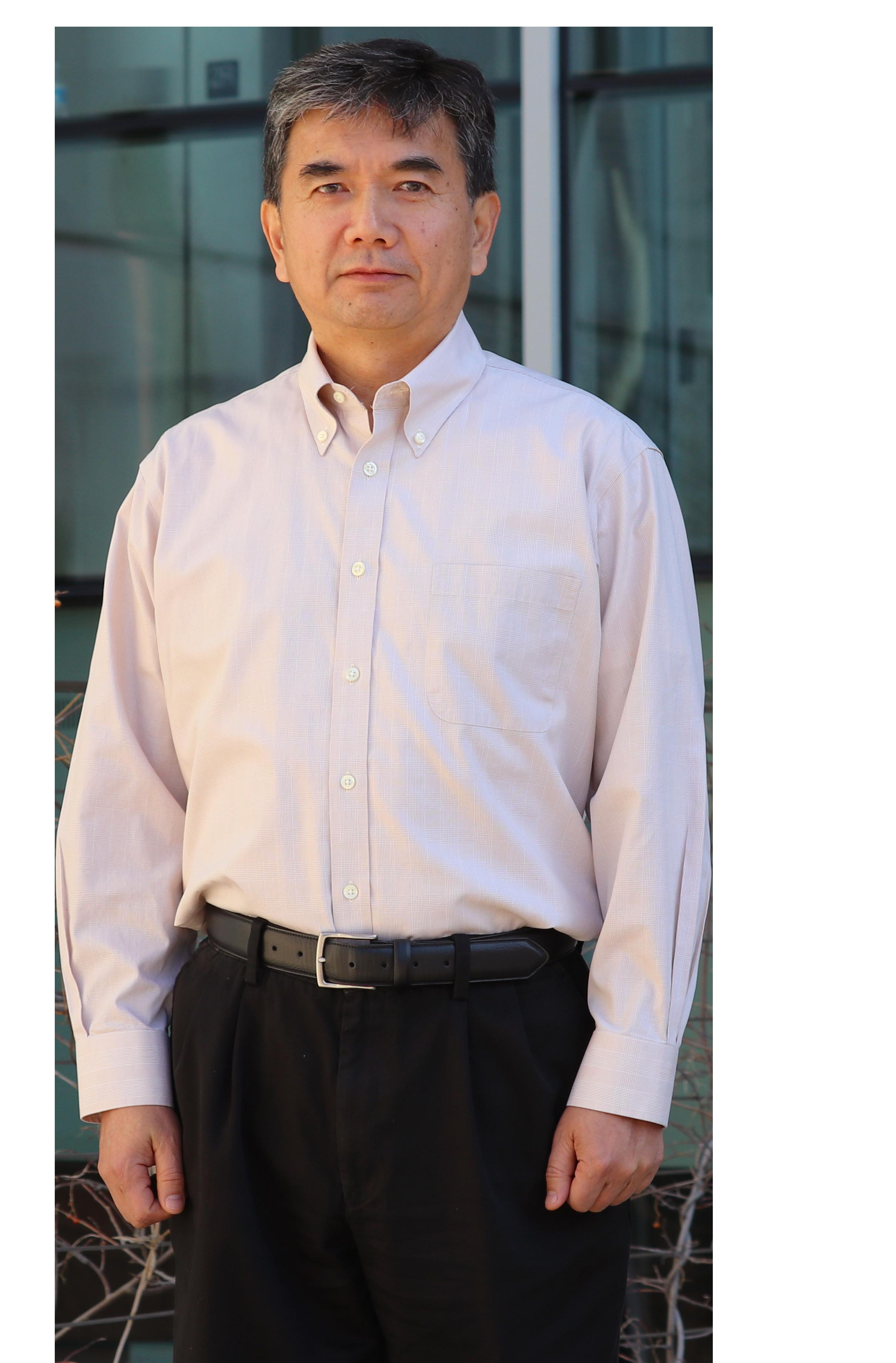
Professor Ching-Long Lin is developing tools to help patients suffering long-term complications in the lungs from COVID-19 with added support from the National Institutes of Health (NIH).
He has been developing a deep learning model that can evaluate and classify data from lung images. He then applies cluster-informed computational fluid and particle dynamics to reveal unique mechanistic phenotypes of airway resistance and particle deposition in the postCOVID-19 clusters. The information can assist in management and treatment of long-term lung infections in post-COVID patients.
Patients who battled severe respiratory infection because of COVID-19 may experience long-term consequences, such as persistent infection in the lung. The lung is the primary site of viral infection.
The focus of the new five year NIH R01 grant is to train the model to detect what researchers believe will be a progression of characteristics or biomarkers unique to COVID-19 survivors. The model will mature based on images from chest X-ray (CXR), which is more accessible, and computed tomography (CT), which is more accurate.
The study will follow up with patients three to four years after preliminary clinic visits to assess the progression features of their clinical and imaging biomarkers. In addition, computational fluid and particle dynamics techniques will be applied to derive mechanistic biomarkers to explain the efficacy of inhaled drug delivery and the susceptibility to risk factors that might augment disease progression.
Lin is the principal investigator of the research project. Co-investigators include Tianbao Yang, Eric A. Hoffman, and Alejandro Comellas.

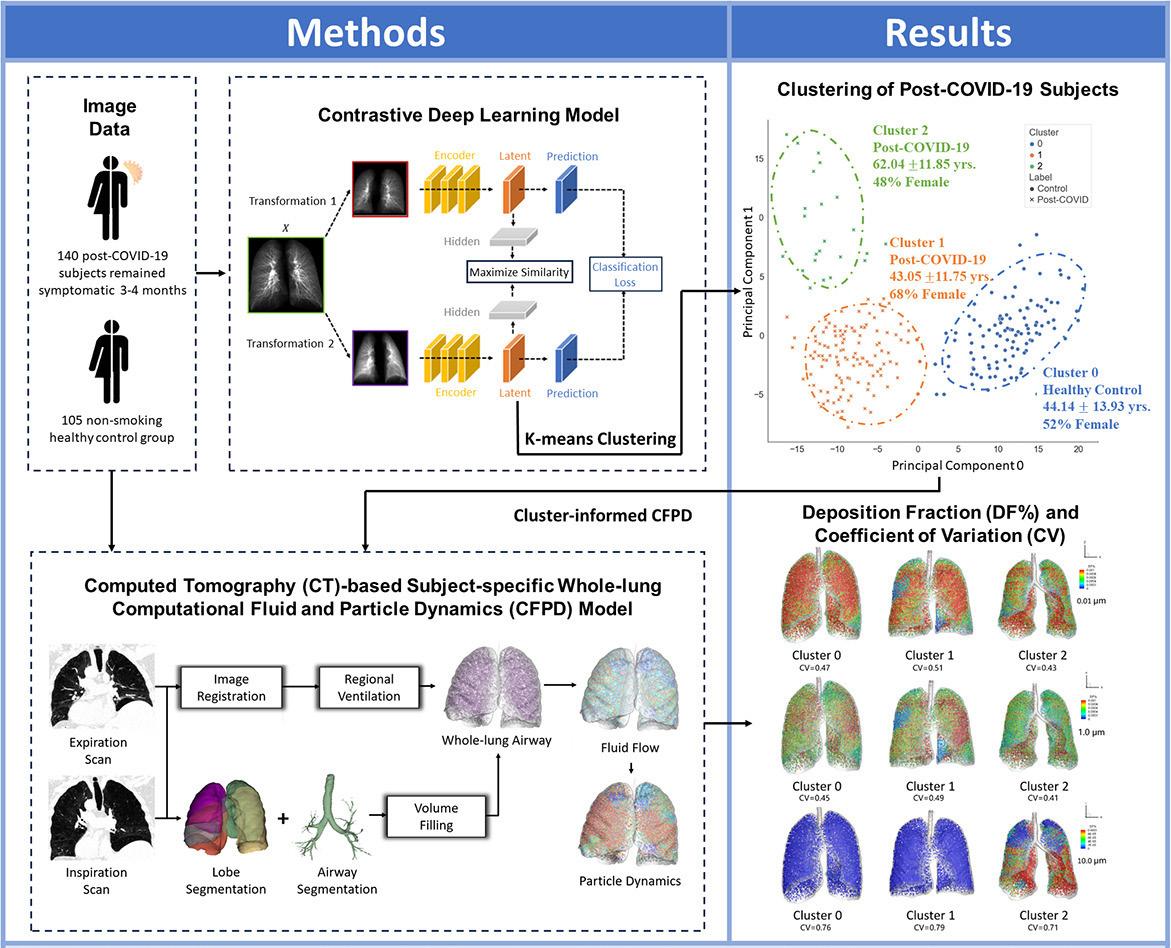
Overview of the study findings: Post-COVID-19 subjects were classified into 2 clusters; Cluster 1 was a female-dominant group with small airway disease and high heterogeneity of ventilation, and Cluster 2 was characterized by older individuals with fibrotic lung. Cluster 1 subjects exhibited elevated resistance in the distal region, leading to a greater proportion of particle deposition in the proximal airways. Conversely, Cluster 2 subjects relocated resistance to the proximal region, enabling particles to penetrate deeper into the lungs.
(Zhang, X et al. European Journal of Pharmaceutical Sciences. 195, 2024, 106724)
Jackson Begolka, an undergraduate student studying mechanical engineering, had an incredible summer adventure. He landed an internship with the NASA Student Airborne Research Program, also known as SARP. This program is centered at the Langley Research Center, and it took Jackson to some exciting places for fieldwork, like the Virginia Commonwealth University’s Rice Rivers Center, and the Goddard Space Flight Center.
Jackson did not just sit around. He teamed up with experts from NASA and NOAA, as well as students from all over the country. Together, they dove into some fascinating research projects. Jackson had the chance to work on projects by himself and with a group, and he later shared his findings at the end of the summer in a research symposium.
Jackson hopped on board various research planes from NASA and Dynamic Aviation. These flights were all about gathering data, which was crucial for his and his team’s projects, not to mention NASA’s mission to better understand the Earth. Their research tackled topics like how Earth’s systems work, what’s in our atmosphere, the quality of the air we breathe, the secrets of forest life, and the mysteries of the ocean’s biology. It was a summer full of discoveries and adventures!
The Student Aviation Research Program is a distinguished name in the field of Earth sciences, celebrated for its exceptional contributions to the world of research and industry. This program, designed to provide a select group of students with a unique opportunity, offered Begolka invaluable experience through active participation in real flight campaigns. For those fortunate enough to be a part of it, SARP not only opens doors to groundbreaking research but also equips them with a robust skill set primed for future success in the Earth sciences.
Begolka was able to gain a firsthand understanding of the extensive efforts and coordination needed to orchestrate successful research campaigns. From logistics management to data collection methodologies, he was immersed in the intricate workings of a field that constantly challenges the boundaries of knowledge. For this undergraduate student, the most significant benefit of SARP was the unparalleled networking opportunities it affords. Scholars and experts from various corners of the Earth sciences domain converge in these campaigns, providing a rich platform for participants to engage with subject matter experts and scientists. This interaction is not just about acquiring knowledge;
it’s about forging connections and understanding the pulse of the field from those at its forefront.
For those considering embarking on a journey in the realm of Earth sciences, the advice of SARP alumni Jackson Begolka holds invaluable wisdom. “If there’s one thing I have learned,” he says, “it’s to ‘Go for the No’.” This simple but powerful mantra encourages aspiring scientists to be their own advocates. It emphasizes the importance of reaching out
to professors
and mentors when
questions
arise. In the
pursuit of knowledge, curiosity is your greatest ally, and there
should be no fear in asking questions. Another key piece of advice he shares is to “openly express your career goals and interests to professors. It enables them to guide and steer you toward opportunities that align with your passions. Remember that you shape your academic path, so seize the opportunity to delve into your interests and shape your path accordingly. There is always room to grow.”

“In the pursuit of knowledge, curiosity is your greatest ally, and there should be no fear in asking questions.”
-Jackson Begolka ME undergraduate

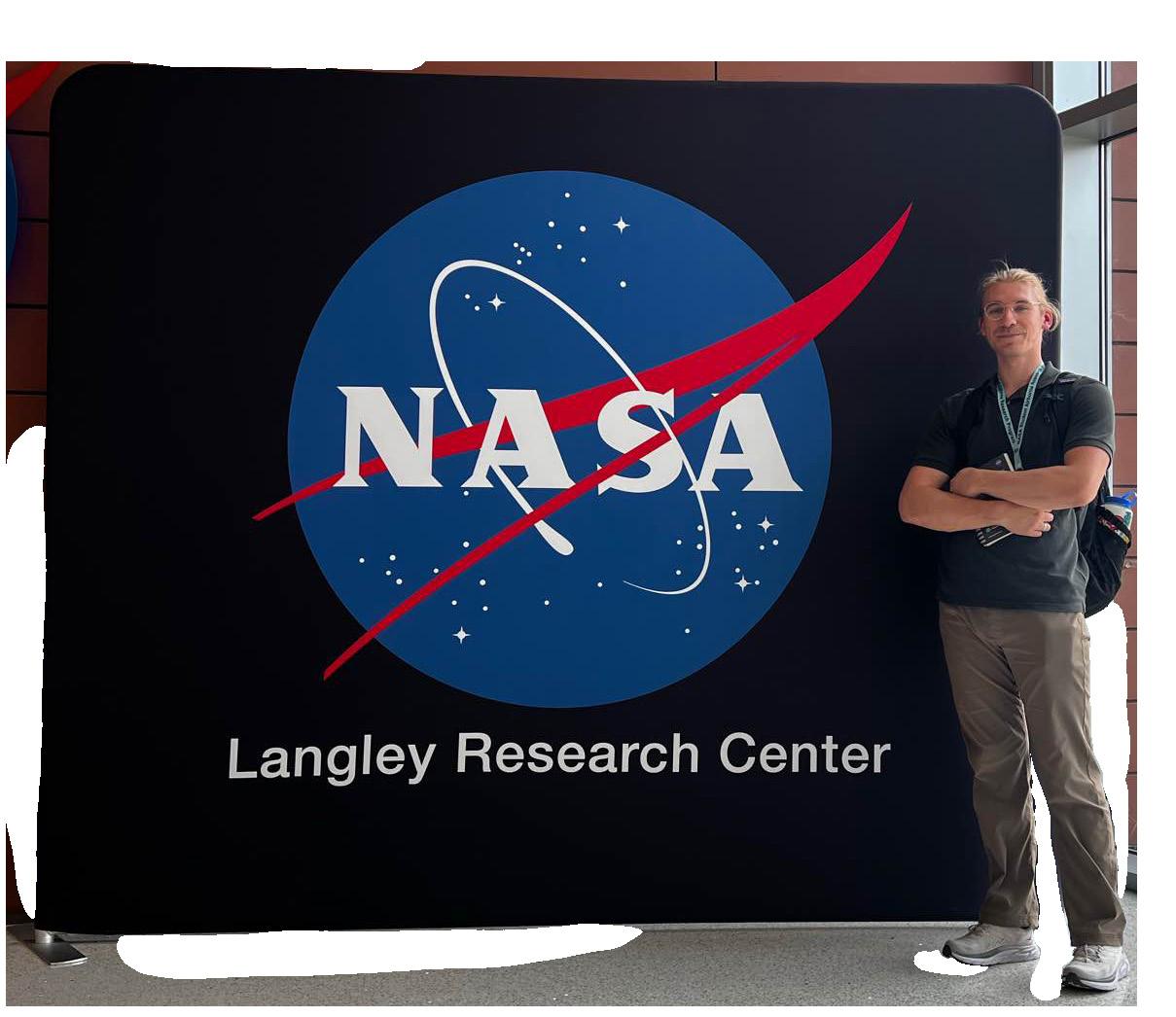 Jackson Begolka stands in front of the NASA Langley Research Center sign in the summer of his internship.
Jackson Begolka stands in front of the NASA Langley Research Center sign in the summer of his internship.
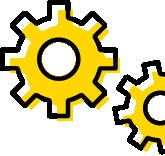
In the corridors of academia, stories unfold, and legacies take shape. Cong Wang, the newly appointed faculty member in the mechanical engineering (ME) department at the University of Iowa, first discovered the institution through an inspiring fluid mechanics lecture series directed by Professor Hunter Rouse from IIHR. These concise and insightful lectures left a lasting mark on Wang during his graduate years, starting a fruitful association with the university through research projects sponsored by the office of naval research.
Wang’s journey into the realm of fluid mechanics began in his childhood, marked by a fascination with the elegant movements of biological locomotion, such as fish swimming and hummingbird hovering. This early curiosity evolved during his college years as he delved into engineering mechanics, where he began to appreciate the delicate flow control capabilities behind these graceful movements. The quest for understanding complex flow phenomena and the application of advanced flow diagnosis tools became the driving force behind Wang’s interest in flow physics, flow control, and flow diagnosis.
As he embarks on his new role at the University of Iowa, Wang expresses excitement about the excellent faculties in the ME department and the inventive minds of the students. He envisions contributing to the department’s educational mission by challenging and inspiring students through frontier research challenges, teaching, and mentorship—an endeavor he considers the most rewarding in his career. Reflecting on his experiences working with students, Wang embraces Confucius’s philosophy of mutual learning. He sees student-mentor relationships as a platform for high-quality intellectual communication, where both parties contribute to each other’s growth.
Wang’s engineering interests lie in the joy of finding challenges and devising creative methods to resolve them. Citing quotes from Theodore Von Karman and Baruch Spinoza, he emphasizes the role of engineers in creating a world that never was and the profound freedom that comes with understanding the underlying physics.
Outside of the lab, Wang has a deep love for being close to nature through family outings to farms, beaches, and road trips. He finds relaxation in the simple pleasure of swimming and the soothing strains of music.
As Wang steps into his role at the University of Iowa, his journey stands as an inspiration—an odyssey shaped by curiosity, passion, and a commitment to the relentless pursuit of knowledge in the captivating realm of fluid mechanics.


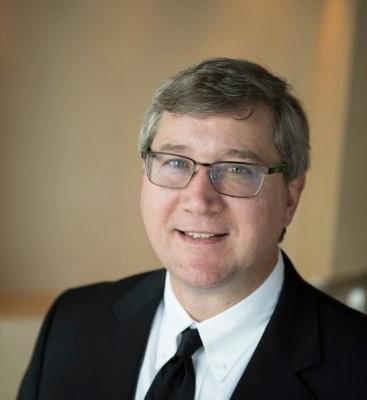
Member of the advisory board since spring 2023
As the Vice President –Intellectual Property / Chief IP Legal Counsel for KBR, Inc. (a Fortune 500 Company),
Gary Machetta has over 30 years of industry experience.
Gary obtained his JD from the University of Houston, MBA from the University of Chicago and his BS in chemical engineering from the University of Iowa.
Gary grew up in Iowa and enjoys watching the Iowa sporting events including women’s basketball and men’s football with his wife and four children.
The advisory board for the University of Iowa Department of Mechanical Engineering consists of esteemed leaders representing various organizations engaged in the field of mechanical engineering. The members contribute by offering valuable insights and direct input, ensuring that the curriculum aligns with the skills essential for students to thrive in their future careers.
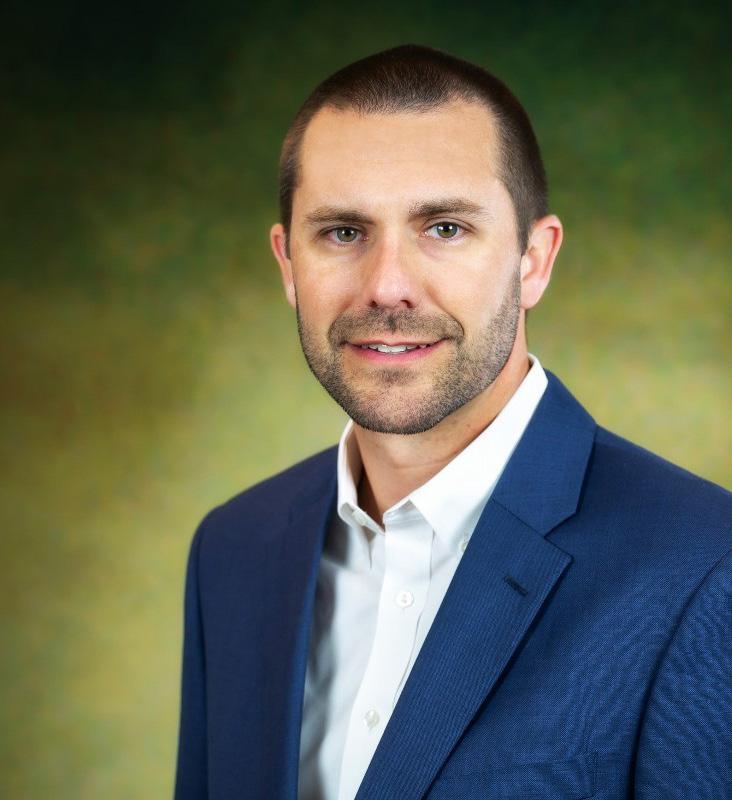
Member of the advisory board since spring 2023
Ross Turbiville is a 2008 University of Iowa engineering grad, with a chemical engineering major. He currently serves as the Director of Final Control Sales with Novaspect. In his free time, he enjoys Iowa athletics, golf and being active with his wife and 2 sons.
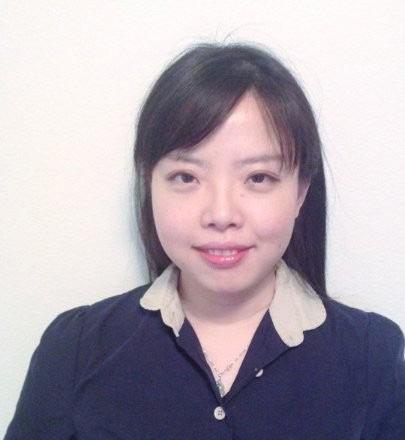
Member of the advisory board since may 2023
Yan Zhang received her PhD in mechanical engineering from the University of Iowa in 2012 and an MBA from the University of Michigan in 2022. She is currently working as a senior engineering manager at Whirlpool, based in Benton Harbor, Michigan, and her role includes leading the U.S. & Mexico engineering team working on refrigeration cooling system.


Embarking on the forefront of innovative research, the Cooperative Autonomous Systems (CAS) Lab stands as a pioneering hub for autonomous and robotic systems exploration. Situated in an annex of the IIHR facilities, it is just a five minute walk from Seamans Center. The lab spans 80 feet by 25 feet by 10 feet and is designed to accommodate up to 1,000 indoor-flying drones— a feat unprecedented globally, as the current maximum is 200 drones. The facility also offers the flexibility to host a range of other robotic applications, including ground, underwater, and humanoid robotics, as well as cross-domain operations involving a combination of these.
Safety is a main concern in the lab. When in use, the autonomous vehicles are contained within a large area that is closed off using a net. The CAS Lab is being updated every day to supply the best possible tools to undergraduate and graduate students and researchers. In the future, the lab will house many more robots for testing large swarms of autonomous vehicles. Continuous improvements upon the technology used in the lab will guarantee that it remains at the forefront of research.
Multiple students in the CAS Lab collaborating with ME professor Venanzio Cichella have been awarded numerous awards for their research, including the John F. Kennedy Memorial Fellowship, Excellence in Undergraduate Research Award, NASA Fellowship, and NASA Iowa Space Grant Consortium Researcher Scholarship.
Top, left to right: Maxwell Hammond, Amirreza Fahim Golestaneh (postdoc), Gage Maclin, Caleb Dirks (UG), Vladimir Petrov, Cristian Sanchez (UG) Bottom, left to right: Venanzio Cichella, Camilla Tabasso, Sabrina Vlk (UG), Niloufar Seyfi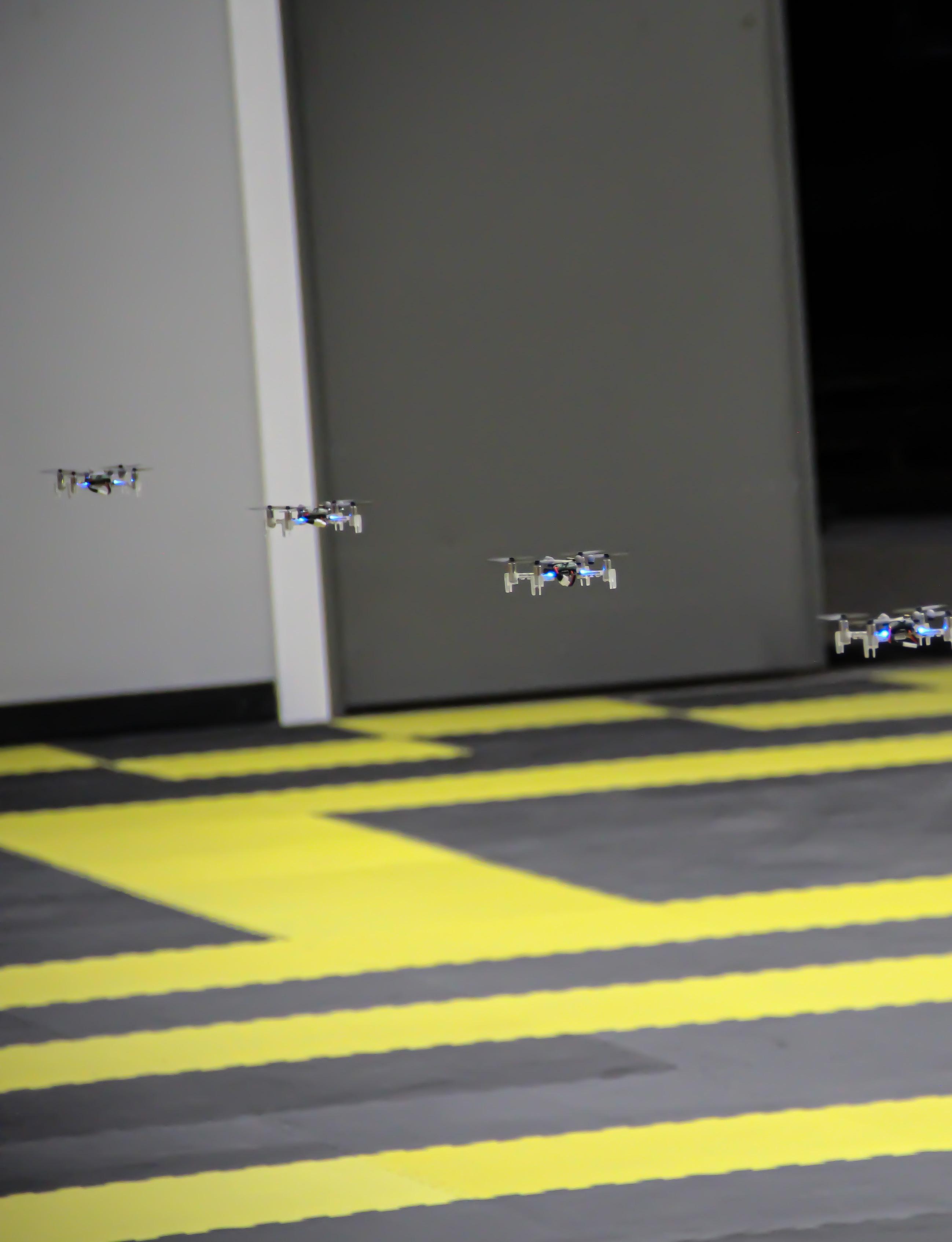
The CAS Lab is located in IIHR—Hydroscience and Engineering in the Stanley Hydraulics Laboratory. The lab provides an excellent educational and research environment for students to design, implement, and test autonomous system planning and control

The Department of Mechanical Engineering (ME) is thrilled to announce the appointment of Abdullah Hassanin, PhD, as the new ME Lab Manager. Hailing from Cairo, Egypt, Hassanin brings a wealth of expertise in the fields of fluid mechanics and experimental engineering and is poised to enhance the educational experience for students in the ME department.
With a distinguished PhD in manufacturing technology and prior service as the senior lab engineer at the Process and Product Development Unit (PPDU) of the American University in Cairo, Hassanin boasts over 18 years of experience at the intersection of manufacturing and academia. He is enthusiastic about embarking on his new journey with the ME department.
Hassanin’s path to the University of Iowa was a unique one. He stumbled upon the opportunity through the virtual professional network LinkedIn. Upon reading the job description, he quickly realized that the position resonated with his aspirations. However, there was a moment of doubt as he grappled with the geographical distance that separated him from Iowa. In fact, prior to this opportunity, Hassanin had never even heard of Iowa. Reflecting on his academic journey, he described his master’s degree in welding technique as both challenging and rewarding. Following this achievement, he decided to pursue a PhD recognizing its pivotal role in modern education and industry.
Before joining the University of Iowa, Hassanin had a rich career history, having worked at three universities. His academic pursuits have always been an amalgamation of engineering and education, further solidifying his passion for mentoring and guiding students toward academic excellence.
Beyond his professional endeavors, Hassanin enjoys quality family time with his children, who live
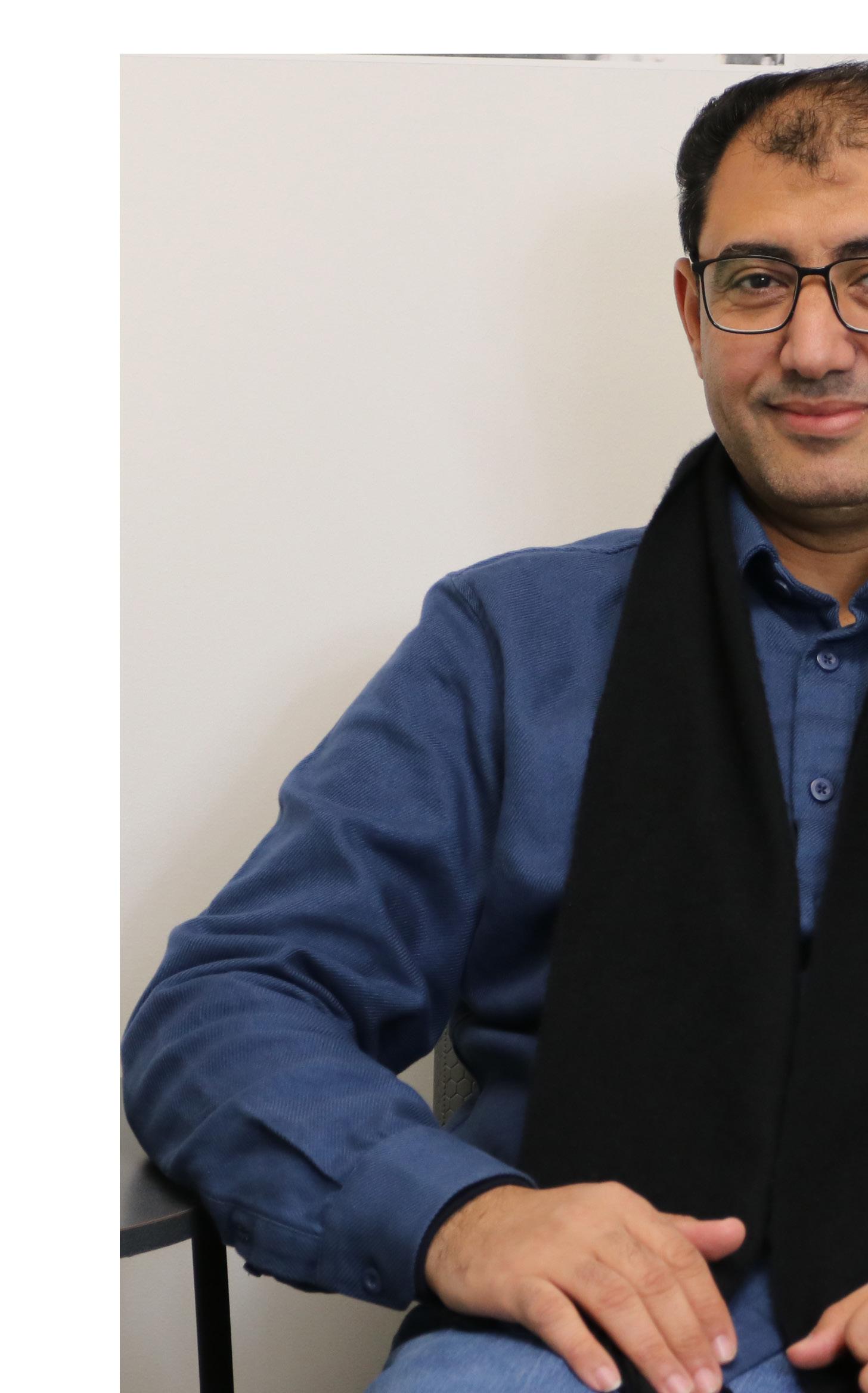
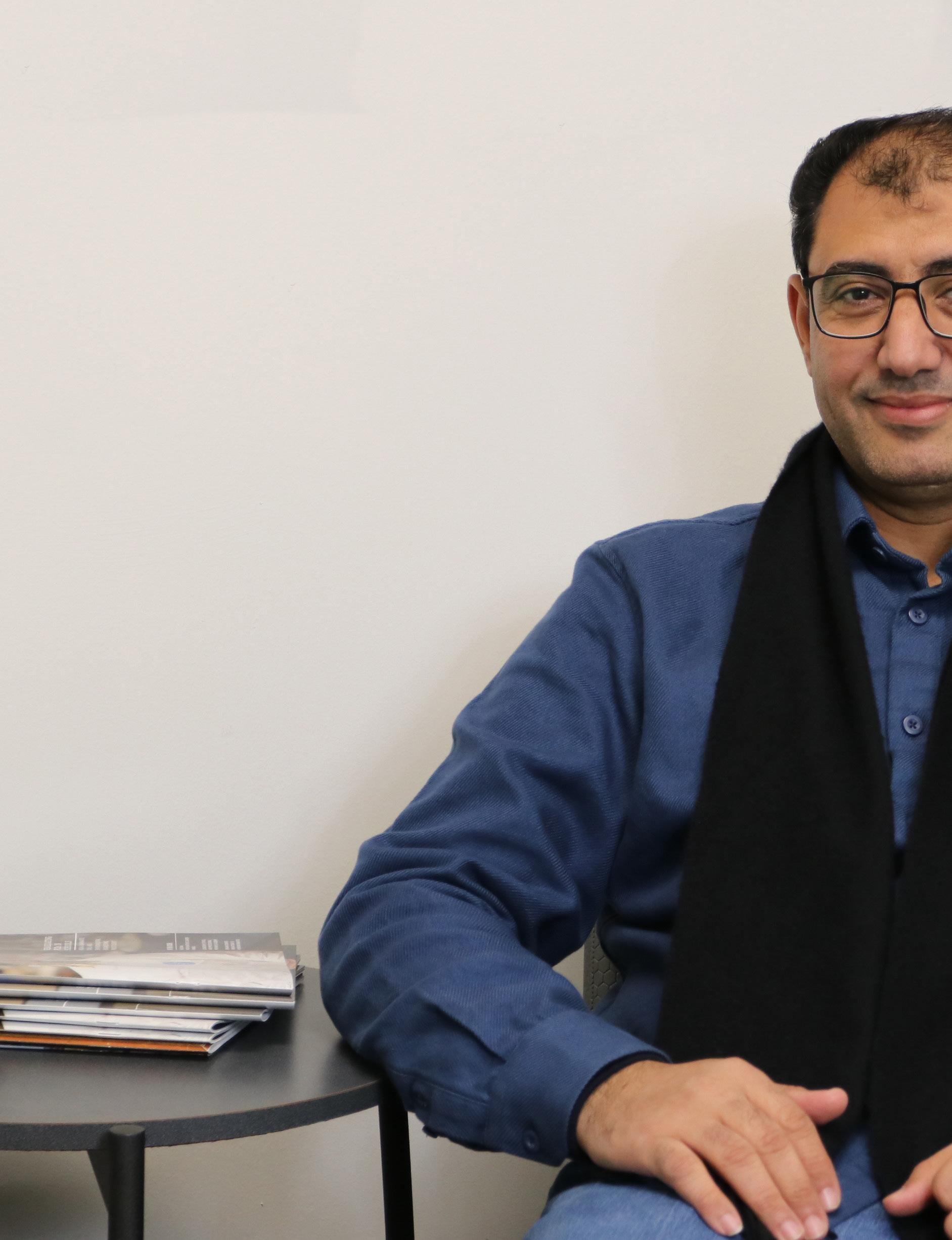

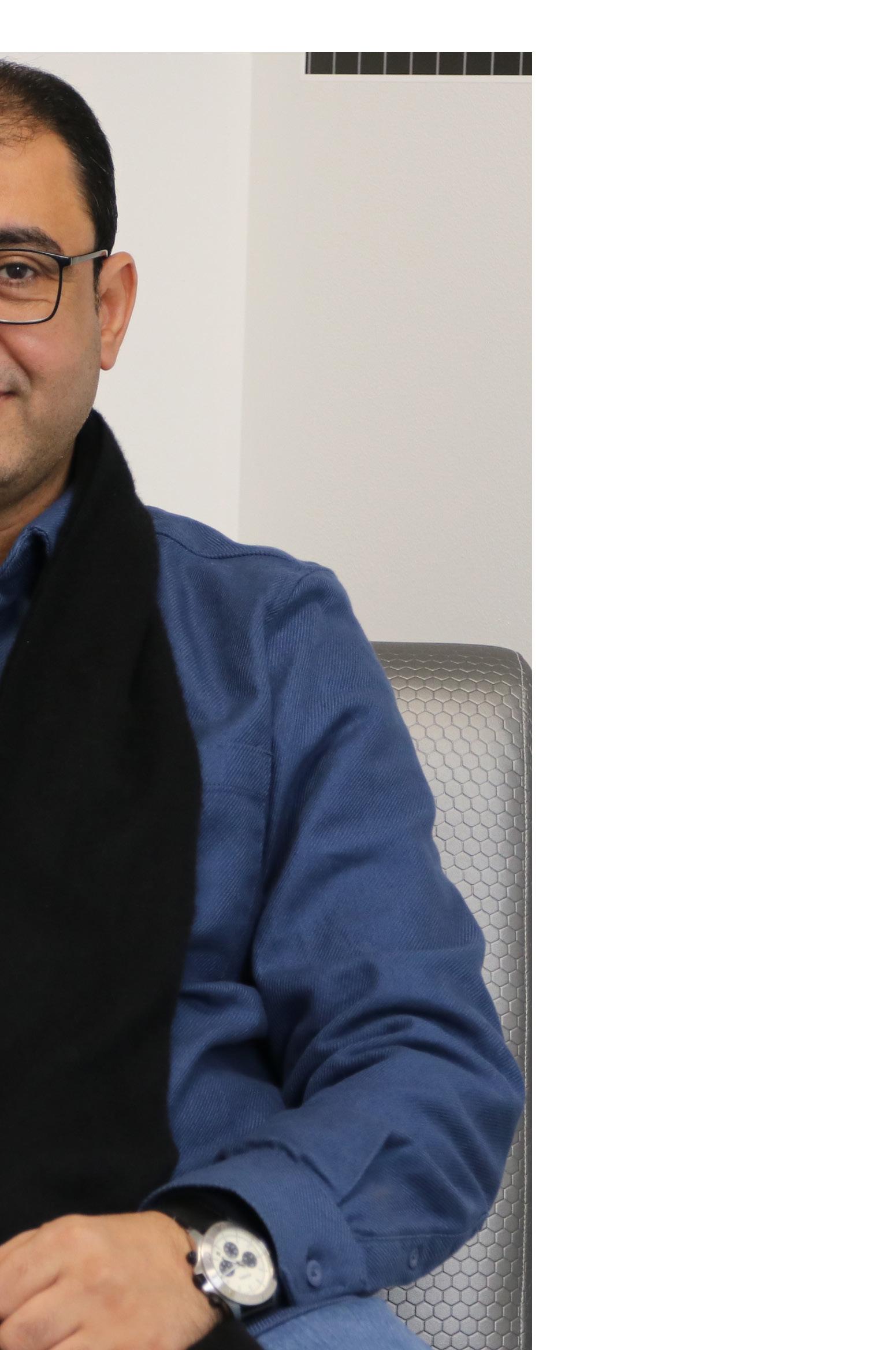
I came here to succeed. I am blessed to work in the ME department because it is a nice environment that motivates me to accomplish my goals.”
-Abdullah Hassanin ME Lab Manager
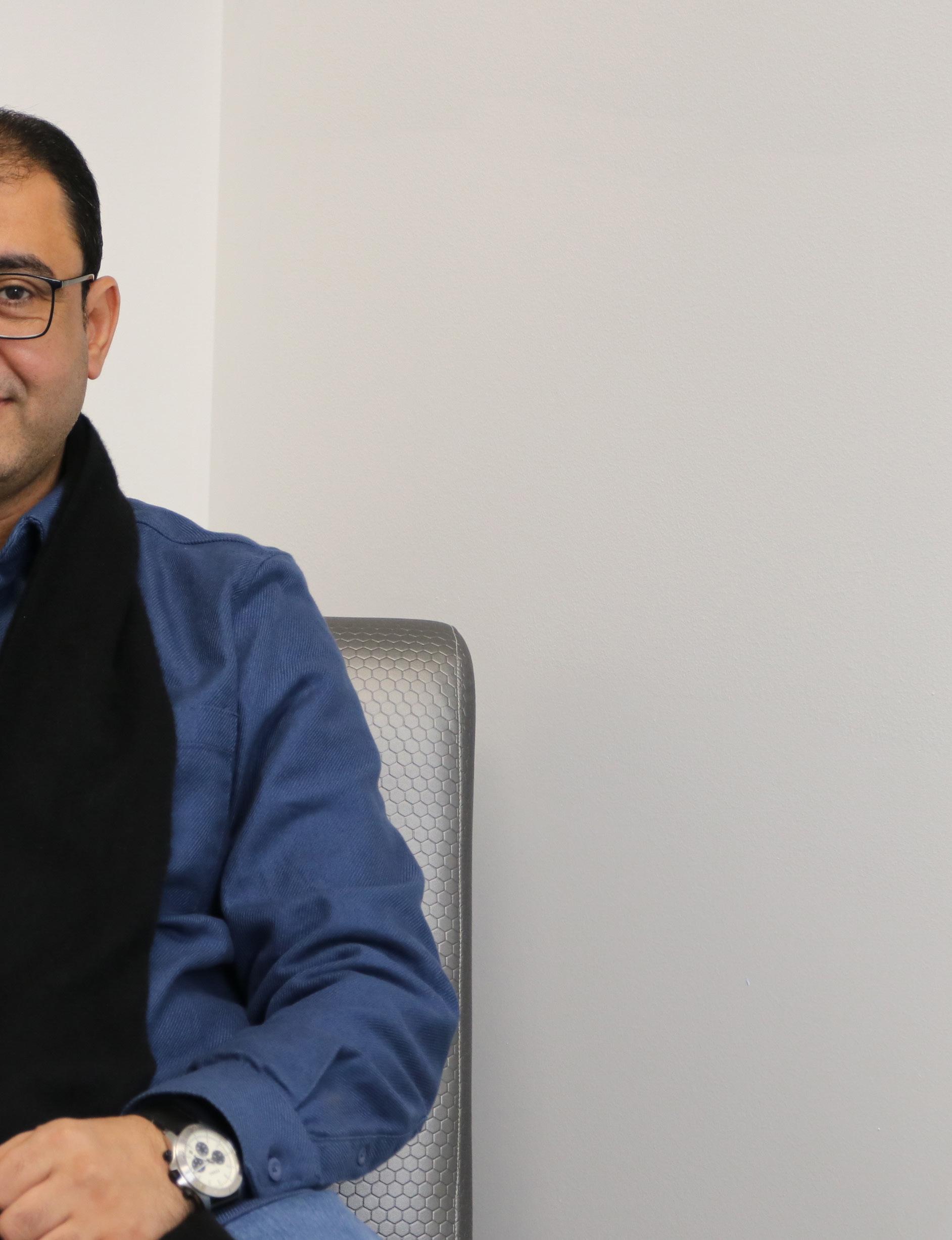
In the heart of a bustling campus, where innovation meets tradition, there’s a man whose connection to the Department of Mechanical Engineering runs deeper than the rivets in a steel beam–David Scholz, the new department administrator with an impressive legacy that goes back more than 50 years.
Scholz carries the University of Iowa College of Engineering in his veins, as his father, Paul D. Scholz, graced the halls as a revered ME professor many years ago. Fond memories of his childhood include running through those very same corridors and exploring the labs on weekends. It is this deep-seated connection that fuels his unwavering commitment to heightening the excellence of the department and college.
From 1967-1992, Paul D. Scholz served as a professor of mechanical engineering, in conjunction with his role as the associate dean of the College of Engineering from 19791992. He derived immense pleasure from interacting with students in the classroom, in research labs, and in the student-sponsored extracurricular activities to which he contributed passionately throughout his career. His vision for computer-aided design as a vital professional tool helped form breakthrough areas of research excellence in the college. In 1993, the Paul D. Scholz Symposium on Technology and its Role in Society was named to honor the late professor who was also a 20-year Tau Beta Pi Iowa Chapter advisor.
Fast forward to 2023: as David Scholz walks into his office, he is greeted by a photo of his father on the walls. He says, “I’ve enjoyed coming to work each day where my dad spent his entire career. [Paul D. Scholz]’s impact on the college continues to live on throughout the building, and that’s a really special feeling.”
Outside of work, David has a 28-year passion for mountain biking. In his opinion, “Happy life requires balance, as does mountain biking.” David is native of Iowa City, a graduate of City High, and received an undergraduate degree from Iowa State University. He has been married for 34 years and has three adult children.

Pictured to the left is Paul Scholz, who served as professor of mechanical engineering from 1967 to 1992, and associate dean of the College of Engineering from 1979 to 1992. Scholz earned a BSME from the University of Washington and an MS and PhD from Northwestern University. From 1960-62, he was a mechanical engineer at the Naval Ordinance Test Station in Pasadena, California.

“I’ve enjoyed coming to work each day where my dad spent his entire career. [Paul D. Scholz]’s impact on the college continues to live on throughout the building, and that’s a really special feeling.”
-David Scholz ME Department Admin
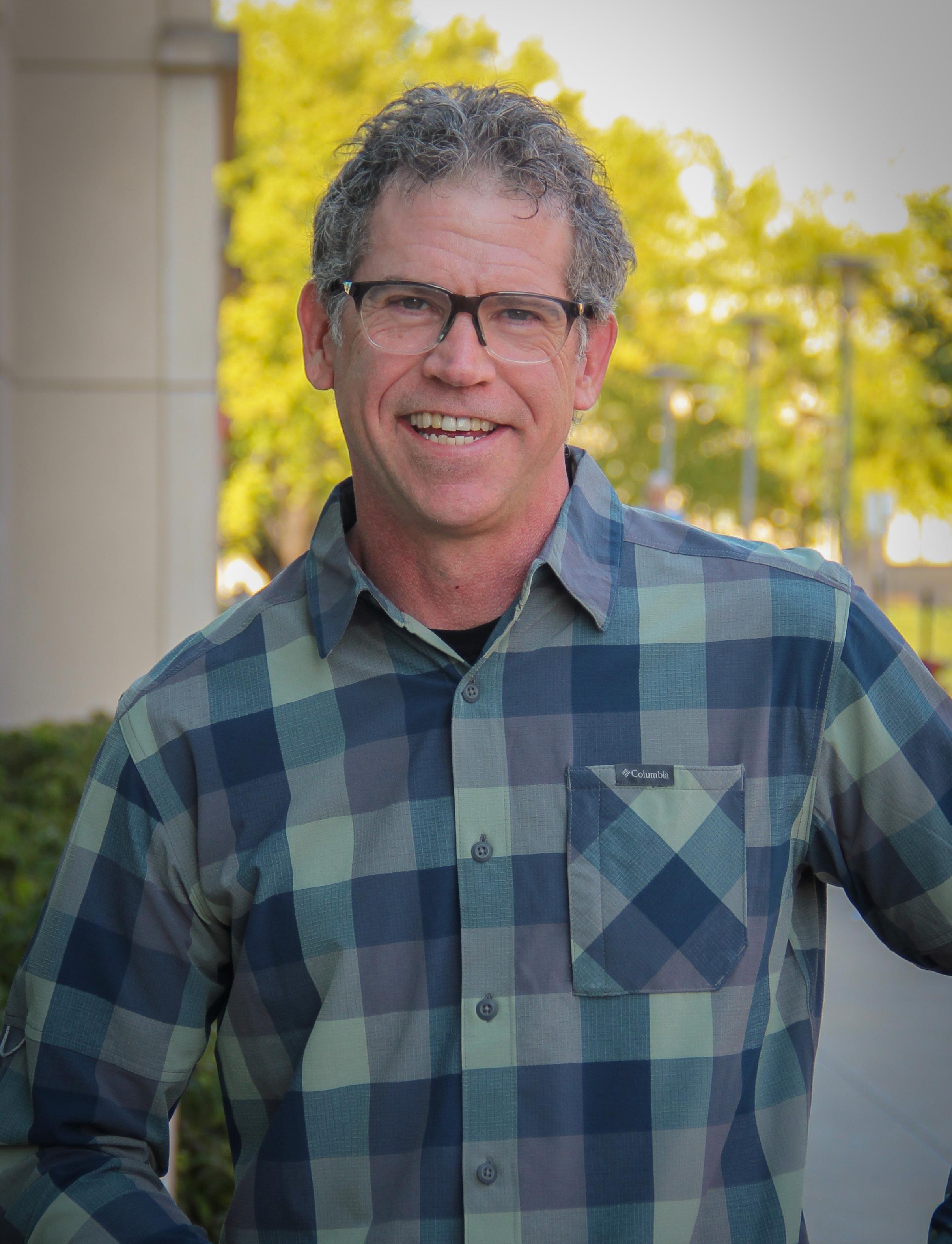

Avik Samanta, an alum of the Department of Mechanical Engineering, will start as a tenure-track assistant professor at the Department of Mechanical Engineering at the University of South Florida in spring 2024. Avik was a PhD student and postdoctoral researcher at the Laser Materials Processing Lab at the University of Iowa, mentored by Prof. Hongtao Ding. Avik sat down remotely for a little Q&A.
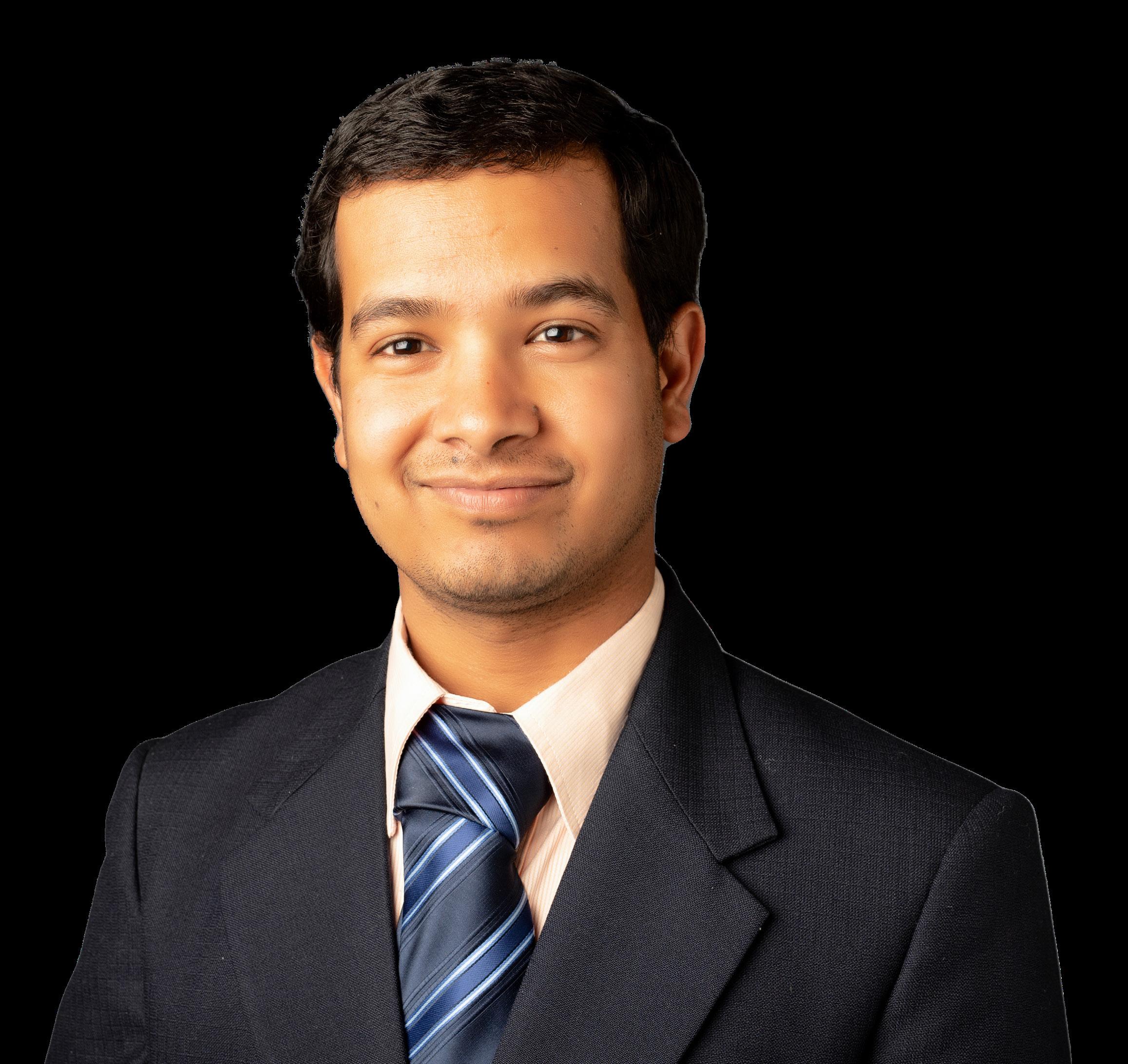
Question: What was your favorite/ most memorable experience at the University of Iowa College of Engineering?
Answer: My PhD journey within the Department of Mechanical Engineering, under the guidance of Prof. Hongtao Ding, was an immensely fulfilling experience. The memory of successfully defending my PhD thesis amidst the middle of the COVID-19 pandemic in 2020 is still vivid and gratifying. I took immense pleasure in serving as a teaching assistant during my time here, encompassing the delivery of comprehensive lectures on solid modeling and the facilitation of hands-on manufacturing lab sessions for undergraduate students. Witnessing these students confidently showcase their final course projects to the broader College of Engineering community was captivating and heartwarming, leaving an enduring impression. Furthermore, my fondness for the annual Research Open House hosted by the College of Engineering was unparalleled, as it provided an exceptional occasion to forge connections with fellow researchers and esteemed faculty members, an opportunity I cherished.
Question: How did the University of Iowa CoE set you apart/prepare you for your new position at the University of South Florida?
Answer: I firmly subscribe to the idea that teaching and mentoring students are vital to one’s academic career. The University of Iowa College of Engineering (UI-CoE) offers an environment that bolsters my personal development of becoming a successful mentor. UI supplied an environment that nurtured me and encouraged collaboration and productivity, greatly contributing to my ongoing journey. UI-CoE’s relatively modest scale as an engineering school facilitated easy access to faculty members, enabling seamless interdisciplinary engagement for research collaboration. My fortune in having exceptional
mentors to provide invaluable guidance cannot be overstated. The experience of collaborating with researchers hailing from diverse disciplines during my time here has been instrumental in enhancing the quality of my future research endeavors. Furthermore, the Department of Mechanical Engineering played a pivotal role in supporting and honing my teaching abilities. Last but certainly not least, mentorship opportunities to undergraduates, fellow graduate students, and high school interns played a pivotal role in nurturing my mentoring skills.
Question: Can you describe what you do in your job, and how you came to be involved in it?
Answer: In my role as a tenuretrack assistant professor, I will actively engage in three core responsibilities: research, teaching, and service to the institution and community. My research duties will involve conducting high-quality independent and collaborative research, with a focus on publishing these findings in reputable academic journals. In addition, I will instruct undergraduate and graduate students, design and deliver courses, and mentor master and doctoral students. Furthermore, I will be actively taking part in departmental and university service activities, including committee work, academic advising, and collaborating with colleagues on various academic initiatives. My aim is to establish an independent research group, demonstrate teaching excellence, and make significant contributions to the academic and institutional mission.
Question: Were there any highlights or unexpected outcomes in your journey to get where you are today?
Answer: I have always believed in gradual career progression, making decisions based on personal experiences. During my undergraduate years, the idea of becoming a faculty member seemed

quite daunting. However, the experiences I accumulated during my industrial and PhD journey have significantly boosted my confidence in pursuing an academic position. Last but certainly not least, my research experience at the Pacific Northwest National Laboratory (PNNL) has further solidified my confidence in becoming an independent researcher.
Question: What did you like best about Iowa City? The University of Iowa?
Answer: Iowa City stands out as one of the most peaceful and safest places I’ve had the privilege to call home for six years. The city and university are friendly and inclusive, making it a wonderful place for research. I also enjoyed taking relaxing walks by the peaceful Iowa River and through the city’s beautiful parks. Plus, as someone who loves food, I had an exciting time trying all the delicious meals in Iowa City, which made my experience even better.
Morgan Craft, undergraduate student, is the social chair for the Society of Women Engineers. She works hard to foster a community of acceptance, sisterhood and trust between each and every member. Her role as a peer mentor allows her to share her experiences and insights, helping others navigate their professional aspirations.
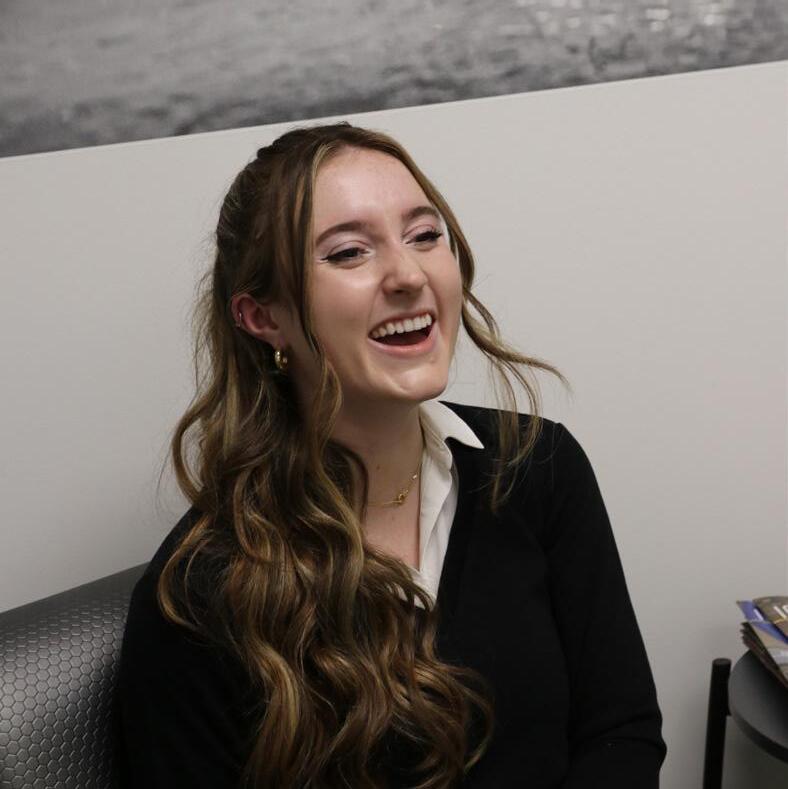
Undergraduate students Olivia Lucas, Anika Gokhale, Katherine Butler, and Nicole Defalco participated in the College of Engineering annual mini golf design contest. These four students applied what they were learning in their heat transfer coursework to the construction of their course. They represented the ME department through using equations, electricty, and electrical circuits in their design. PhD graduate Prarthana Parepalli spent nearly seven years working as a computational fluid dynamics engineer with Ford Motor Company before starting the University of Iowa’s PhD program in mechanical engineering. Although reacclimating to academic life—one punctuated by two pregnancies and a pandemic—wasn’t easy, Parepalli says the support she received at Iowa allowed her to advance her knowledge while also starting a family. In fact, she gave birth just days after successfully defending her dissertation.


Congratulations to the graduate students who received scholarships for the fall 2023 semester. This group of outstanding students works hard on their studies, research, and teaching assistant (TA) duties. They are pulled in many different directions and do an excellent job setting examples for future students and representing the college and department. Pictured from left to right are: Yajatra Kulkarni, Zac Williston, Jonathan Cordero, Nicholas Nahnybida, and Oluwaferanmi Badejo. Vivek Karmarkar is not pictured.
Yajatra Kulkarni received the Venkatachalam Planjery Memorial Scholarship. He is a TA for ENGR:2510 Fluids and will be graduating with his MS in 2024. His thesis is focused on kinematic shape sensing of 2D plates. His past experiences include projects with the NASA L’Space Academy and internships at Collins Aerospace. His advisor is Professor Casey Harwood.
Zac Williston received the Richard B. Stewart Scholarship. He is currently in his first year of graduate school and plans to graduate in May 2027 with a PhD in mechanical engineering. His research is focused on creating improved models for ankle-foot orthoses and designing mechatronic devices to test their mechanical properties. He is a TA for ME:4086 Program for Enhanced Design Experience (PEDE), and his advisor is Professor Deema Totah.
Jonathan Cordero received the Sharada Devi Planjery Memorial Scholarship. He is a TA for both ME:3351 Engineering Instrumentation and ME:4086 Mechanical Engineering Design Project. Cordero is a U2G student

who will graduate with his MS. Throughout his studies at Iowa, he has been heavily involved in the world of fluid mechanics and the numerical approaches to find transient and steady state solutions to setups. His advisor is Professor Justin Garvin.
Nicholas Nahnybida received the Sharada Devi Planjery Memorial Scholarship. Nahnybida graduated in May 2023 with his BSE in mechanical engineering and will again graduate in May 2024 with a MS in mechanical engineering through the U2G program. He is a TA for ME:4048 Energy Systems Design, and also is a design and test engineering intern working at the Rock Island Arsenal for the U.S. Army DEVCOM CBC. His advisor is Professor Austin Krebill.
Oluwaferanmi Badejo received the Ray L. and Edna P. Sweigert Memorial Scholarship. He is currently getting his MS and plans to graduate in the spring of 2024. Badejo was involved in research during the last year of his undergrad in the Robotics and Assistive Device (RAD) lab. He worked on how facemasks affected the jaw muscles and looked at the potential effects over time. Badejo is a TA for ME:3351 Engineering Instrumentation, and his advisor is Professor Deema Totah.
Vivek Karmarkar received the Rajyalaakshmi and Shankar N. Planjery Scholarships. He was a TA for ME:5113 Mathematical Methods in Engineering. Karmarkar’s primary skills lie in classical physics, sports engineering, Python, and MATLAB. Karmakar is a PhD student under the joint instruction of Professors Jia Lu (ME) and Thomas Folland (Physics) investigating physics-informed neural networks for inverse optical problems.
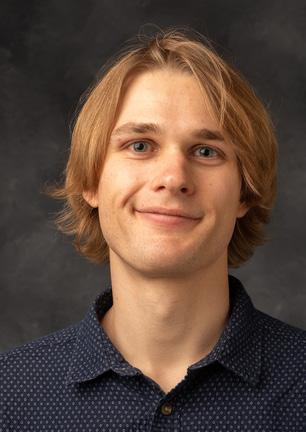
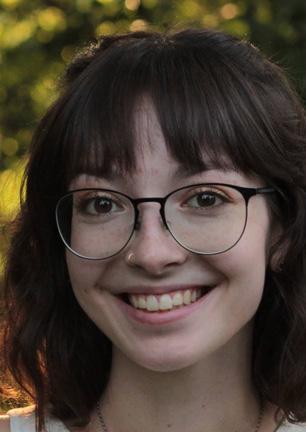
We are extremely happy to announce that two ME students have won the prestigious UI Graduate Research Excellence Award and Excellence in Undergraduate Research Award.
Sabrina Vlk is a mechanical engineering major, with a minor in mathematics and an Artificial Intelligence, Modeling, and Stimulation (AIMS) certificate. She was nominated by Venanzio Cichella, assistant professor of mechanical engineering.
Maxwell Hammond, a doctoral student in the Department of Mechanical Engineering, conducts research in the domain of soft robotics.


Thank you for the generosity of the scholarship donors. This financial assistance will help students fund their education and help the college and department attract superior graduate students. Being a graduate TA allows the student to build their leadership skills, work closely with a faculty member, develop a deeper understanding of the course information, and satisfy a desire to help others. If you are interested in donating or starting a scholarship, please visit the engineering.uiowa.edu/me website and click on the “Give Now” link.
Follow us on social media! @uiowame Contact us at ME-dept@uiowa.edu

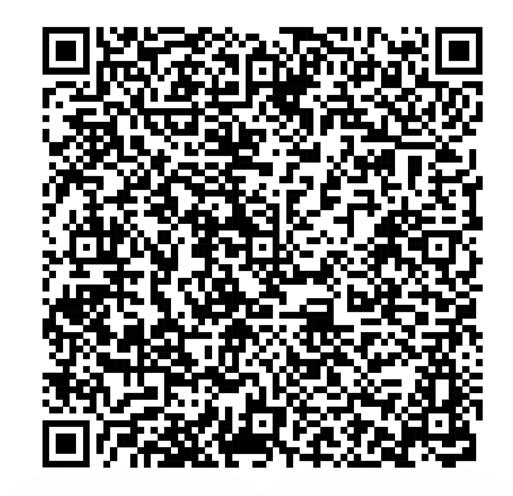
The Iowa Space Grant Consortium (ISGC) awards fellowships to support outstanding graduate students at Iowa and Iowa State pursuing research opportunities in science, technology, engineering, and math (STEM) disciplines that support the mission of NASA. Scan the code below to browse internship and funding opportunites today!

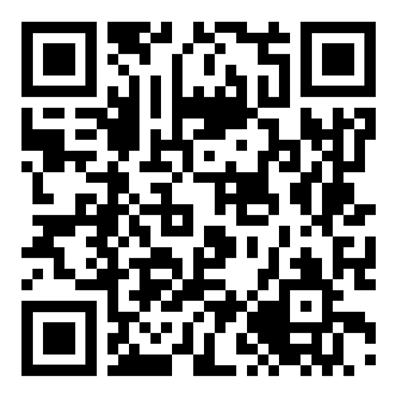

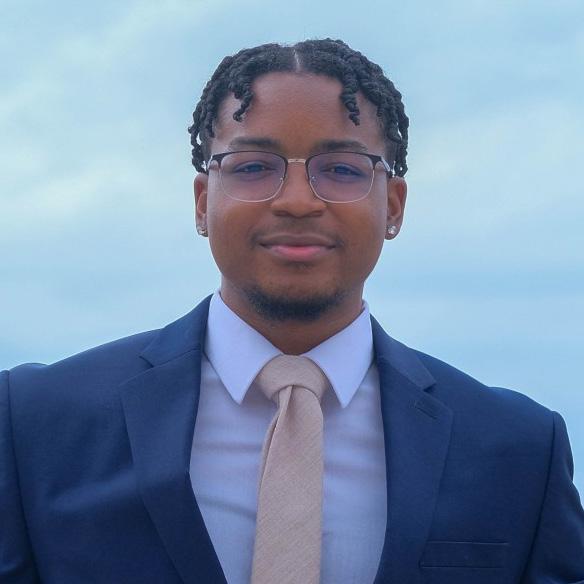
I graduated from the University of Iowa in May 2022 with a bachelor’s degree in mechanical engineering and moved all the way to Irvine, CA, to work for Rivian as a trail engineer. During my time at Rivian, I was a part of the Closures team that designed the doors, liftgate, tailgate, and the hood for all three vehicles. Currently, I am at Tesla as a production engineer trainee at Gigafactory 1 in Reno, Nevada, working with the battery enclosures for the Model 3/Y. There are new challenges every day at Tesla, which allows me to grow and learn. Manufacturing is about making every second count and ensuring that quality is a top priority.
For my undergrad, I chose a tailored elective focus area because it allowed me the flexibility to pick courses that I believed would make me the most well-rounded engineer I could be. Being a teaching assistant allowed me to improve my communication skills and grow as a leader. It is important to mention that professional organizations such as the National Society of Black Engineers (NSBE) helped me gain professional and personal skills by attending conferences and workshops. Also, having the opportunity to gain experience and work alongside the best professors and students in the country helped my growth tremendously going into my first job!
My advice for Hawkeye engineers is to explore different organizations and social groups, and even travel to different states/countries in pursuit of your goals and dreams!
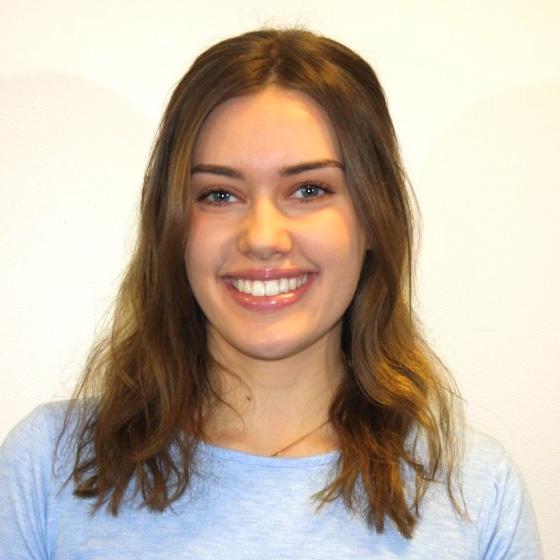
I graduated from the University of Iowa in 2022 with a BSE in mechanical engineering. After graduation I started working as a design engineer for Harley Davidson at their headquarters in Milwaukee, WI. At Harley Davidson, I work in the Parts & Accessories—Rider Vehicle Interface division. I primarily spend my time working on new product development with other engineers and designers. This process includes developing CAD models, analyzing FEA, meeting with suppliers to design for manufacturing and ensure a cost-effective design, and making sure we’re meeting regulatory requirements.
The work I do here has greatly allowed me to expand on my engineering knowledge and communication skills. Most importantly, I can honestly say that I have the coolest job ever. The passion customers have towards Harley Davidson is infectious and undeniable. I get to spend every day doing what I love as an engineer with the knowledge that thousands are waiting to see what new products we’re coming up with.
My advice to other Hawkeyes would be to expose yourself to as many different areas of engineering as possible. There is nothing you can learn that is a waste of time. I spent my first couple years of undergrad studying as a biomedical engineering major. As it turns out, how an engine functions is pretty comparable to how the heart functions. All of my extracurricular experiences were beneficial and helped me grow as an engineer. The University of Iowa offers so many opportunities. Get involved. Spend time finding out what you’re passionate about. You wont regret it. My last note would be to take a class with Phil Deierling.

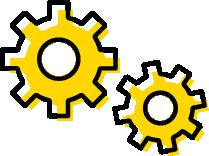

The University of Iowa
103 South Capitol Street
3131 Seamans Center for the Engineering Arts and Sciences
Iowa City, IA 52242

The University of Iowa prohibits discrimination in employment, educational programs, and activities on the basis of race, creed, color, religion, national origin, age, sex, pregnancy (including childbirth and related conditions), disability, genetic information, status as a U.S. veteran, service in the U.S. military, sexual orientation, gender identity, or associational preferences. The university also affirms its commitment to providing equal opportunities and equal access to university facilities. For additional information on nondiscrimination policies, contact the Director, Office of Institutional Equity, the University of Iowa, 202 Jessup Hall, Iowa City, IA 52242-1316, 319335-0705, oie-ui@uiowa.edu.